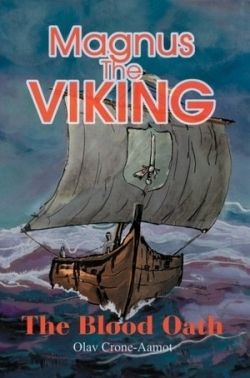Magnus the Viking
Oathsworn to avenge the death of his father and the ravishing of his mother and sister by Hjartan and his band of marauding Vikings, young Magnus sets about on a journey to find his manhood and reclaim his rightful home. Though action-packed and quickly paced, the story is more than a tale of hand-to-hand combat. The author shares the rewards of forty years of research into the culture of these seafarers, and in so doing, succeeds in portraying the characters and events of this early medieval era with great historical authenticity. Here the reader will discover the Vikings as they really were–much more than just bold warriors. They were shipbuilders, skilled navigators and explorers, traders, and artisans.
On his journey, Magnus trains in swordsmanship, martial arts, and tactical war strategy. At the heart of this tale is a coming-of-age transformation from a restless boy to a man and charismatic leader. With a magnetic persona and a bold, unpretentious nature, he magically moves others to feel empowered. As Magnus gains confidence and wisdom, his martial spirit builds. Soon he plots a bold course of action, carefully mobilizing a small but select band of warriors.
As the forces of Christianity begin to spread throughout the lands, the Old Norse traditions are on the verge of becoming lost. A sense of inevitability and impending doom pervades, for example, in the scene of Magnus’ rescue of two priests from certain death. Despite his rage at their ingratitude and demands for conversion, it becomes clear that the days of Norse pagan culture are numbered.
Magnus is joined by a fearless martial arts master who teaches him the art of fighting. Magnus and his cohort face all kinds of danger on their voyage—silent marauders lurking in the dark fjords waiting to pounce. But unlike other Viking tales, this story avoids the trope of gratuitous blood spilling. Indeed, there are battle scenes where cruel justice is meted out, but the fact that Vikings were nothing more than barbarians is simplistic. It was a matter of survival. The Vikings were not the only people who mustered their martial spirits for battle. They just happened to excel at it.
Magnus presents an attractive demeanor, much like the classic chivalrous knight Prince Valiant. In true heroic fashion, Magnus exerts a powerful presence to everyone he meets. And as expected, Magnus is distracted by fair maidens who test his self-discipline. However, the reader learns that there is more to him than his persona. Magnus symbolizes much more than a warrior nation. The Vikings were innovative shipbuilders and excelled as navigators, devised a humane code of morality in a just legal system (the Ting), and respected honor and loyalty above any passions for greed and glory.
As a historical novel, the book will appeal to lovers of early medieval history. In a uniquely epochal style of writing, the author has succeeded in creating a tangible and compelling sense of being there.
Reviewed by
Gary Klinga
Disclosure: This article is not an endorsement, but a review. The publisher of this book provided free copies of the book and paid a small fee to have their book reviewed by a professional reviewer. Foreword Reviews and Clarion Reviews make no guarantee that the publisher will receive a positive review. Foreword Magazine, Inc. is disclosing this in accordance with the Federal Trade Commission’s 16 CFR, Part 255.

